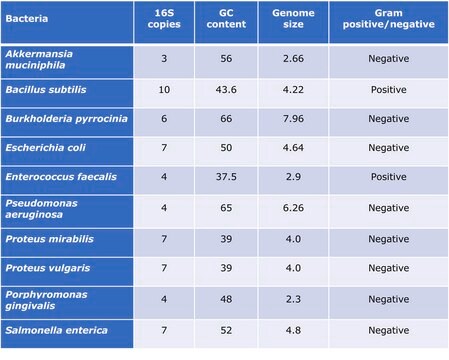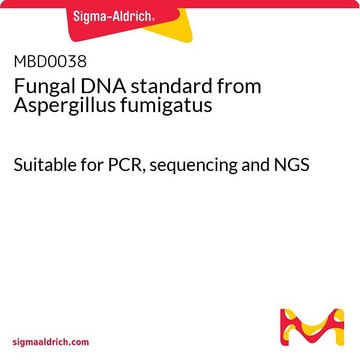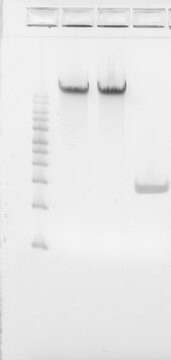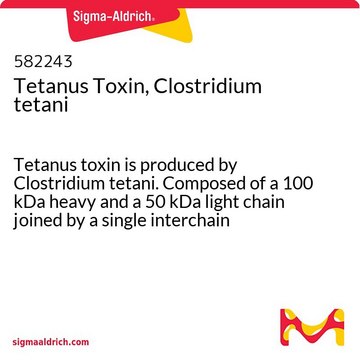MBD0036
Microbial DNA standard from Vibrio harveyi
Suitable for PCR, sequencing and NGS
Faça loginpara ver os preços organizacionais e de contrato
About This Item
Código UNSPSC:
41105500
NACRES:
NA.51
Produtos recomendados
Nível de qualidade
Formulário
liquid
composição
, 10 ng/μL
técnica(s)
FISH: suitable
Condições de expedição
ambient
temperatura de armazenamento
−20°C
Descrição geral
Standardization of sample analysis is currently needed in microbiome genomics research workflow. Lack of standardization can lead to biases and errors in common processes during sample preparation and analysis such as sample amplification, sequencing and bioinformatics analyses.1 Vibrio Harveyi genomic DNA microbial standard can serve as standard for benchmarking the performance along the workflow of microbiomics or meta-genomics analyses and as a tool to increase reproducibility and allow comparison of results obtained by different labs.
Since V. Harveyi is not a typical resident of the human microbiota it can serve as a spike-in standard in human microbiota genomics workflow analysis.
V. harveyi is a gram negative, rod-shaped, motile, heterotrophic marine luminous pathogen bacterium that widely inhabits natural aquatic environments. It belongs to the family Vibrionaceae of class Gammaproteobacteria 2, known as a serious bacterial pathogen of marine fish and invertebrates, including penaeid shrimp in aquaculture 2,3.
V. harveyi has the ability to regulate gene expression by quorum sensing. Current research 4,5,6 demonstrates 3 regulatory molecules that mediate quorum sensing in in V. harveyi; homoserine lactone (HAI-1) , a furanosyl borate diester (AI-2) and cholerae autoinducer 1 (CAI-1). The quorum sensing pathway that regulates bioluminescence, biofilm formation and other virulence factors in V. harveyi is very similar to the pathway that regulates virulence factor expression in Vibrio cholerae, 7, 8 making V. harveyi an important model system for human health research.
Since V. Harveyi is not a typical resident of the human microbiota it can serve as a spike-in standard in human microbiota genomics workflow analysis.
V. harveyi is a gram negative, rod-shaped, motile, heterotrophic marine luminous pathogen bacterium that widely inhabits natural aquatic environments. It belongs to the family Vibrionaceae of class Gammaproteobacteria 2, known as a serious bacterial pathogen of marine fish and invertebrates, including penaeid shrimp in aquaculture 2,3.
V. harveyi has the ability to regulate gene expression by quorum sensing. Current research 4,5,6 demonstrates 3 regulatory molecules that mediate quorum sensing in in V. harveyi; homoserine lactone (HAI-1) , a furanosyl borate diester (AI-2) and cholerae autoinducer 1 (CAI-1). The quorum sensing pathway that regulates bioluminescence, biofilm formation and other virulence factors in V. harveyi is very similar to the pathway that regulates virulence factor expression in Vibrio cholerae, 7, 8 making V. harveyi an important model system for human health research.
Aplicação
Suitable as a standard for PCR, Sanger and next generation sequencing (NGS).
Características e benefícios
- Individual microbial standard for microbiomics and meta-genomics workflow
- Suitable standard for PCR, Sanger sequencing and 18S NGS
- Improves bioinformatics analyses
- Increases reproducibility and repeatability
- Identity and purity of the genomic V. harveyi DNA has been confirmed by 18S NGS and gel electrophoresis
forma física
The genomic DNA is provided in at ≥10 ng/μl concentration in TE buffer pH 8.0.
Outras notas
It is recommended to avoid freeze thaw cycles of this product
Código de classe de armazenamento
12 - Non Combustible Liquids
Classe de risco de água (WGK)
WGK 1
Escolha uma das versões mais recentes:
Certificados de análise (COA)
Lot/Batch Number
It looks like we've run into a problem, but you can still download Certificates of Analysis from our Documentos section.
Se precisar de ajuda, entre em contato Atendimento ao cliente
Já possui este produto?
Encontre a documentação dos produtos que você adquiriu recentemente na biblioteca de documentos.
Nossa equipe de cientistas tem experiência em todas as áreas de pesquisa, incluindo Life Sciences, ciência de materiais, síntese química, cromatografia, química analítica e muitas outras.
Entre em contato com a assistência técnica








